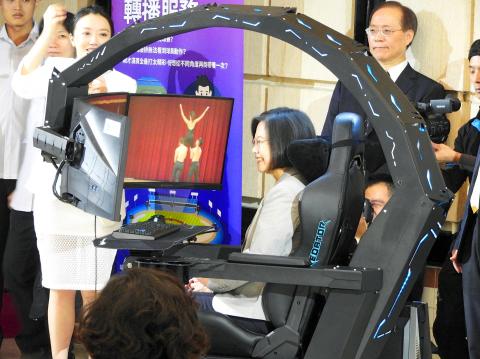Chunghwa Telecom Co (中華電信) yesterday conducted a 5G spectrum-based field trial for autonomous vehicles at a lab in New Taipei City’s Banciao District (板橋) to demonstrate vehicle-to-infrastructure technology developed by a subsidiary.
The company expects to provide more autonomous vehicle tests and trials using 5G networks at its lab in the future.
“Our aim is to help grow this 5G value chain ranging from chips and small cell stations to all kinds of applications,” Chunghwa Telecom chairman Sheih Chi-mau (謝繼茂) told reporters on the sidelines of the field trial.

Photo: Lai Hsiao-tung, Taipei Times
The company focuses on the delivery of real-time information, such as traffic data to vehicles using high-speed and low-latency 5G technology, while Kingwaytek Technology Co (勤崴), a 26 percent held subsidiary, is helping to develop autonomous driving systems, particularly for shuttle buses, Sheih said.
Kingwaytek is a supplier of high-definition (HD) electronic maps and vehicle navigation systems.
“We are developing a decisionmaking system for self-driving vehicles and a traffic prediction system, which will be combined with our HD electronic maps to complete our self-driving solution,” Kingwaytek chairman Alfred Ko (柯應鴻) said.
Kingwaytek plans to conduct a series of self-driving field trials next year in collaboration with Automotive Research and Testing Center (車輛研究測試中心) via a sandbox program in Changhua County, Ko said.
The trial, if successful, would pave the way for the company to sell its self-driving solutions overseas in the next two to three years, injecting new revenue growth momentum into the business, he said.
Southeast Asian nations would be ideal markets, as Chunghwa Telecom’s strength in the region could provide leverage, he said.
Kingwaytek operates one autonomous vehicle trial field in Changhua County and another in Taoyuan’s Hutoushan (虎頭山).
Yesterday, Chunghwa Telecom and Taiwan Mobile Co (台灣大哥大) both said separately that they have submitted their applications to bid for 5G bandwidth and are prepared to substantially invest in 5G network deployment.
Asked if Taiwan Mobile still aims to secure 100 megahertz of bandwidth at the auction, Taiwan Mobile president Jamie Lin (林之晨) said: “Only for a reasonable price.”
“Taiwan Mobile will make 5G [services] available in the second half of next year,” Lin said.
The telecom is in talks with multiple agencies about launching 5G trial fields, he said, adding that the company has one trial field in the baseball stadium in New Taipei City’s Sinjhuang District (新莊).

US PROBE: The Information reported that the US Department of Commerce is investigating whether the firm made advanced chips for China’s Huawei Taiwan Semiconductor Manufacturing Co (TSMC, 台積電), the world’s largest contract maker of advanced chips, yesterday said it is a law-abiding company, and is committed to complying with all applicable laws and regulations including export controls. The Hsinchu-based chip giant issued the statement after US news Web site The Information ran a story saying that the US Department of Commerce has launched a probe into TSMC over whether it breached export rules by making smartphone or artificial intelligence (AI) chips for China’s Huawei Technologies Co (華為). “We maintain a robust and comprehensive export system for monitoring and ensuring compliance,” the statement said. “If we

DEMAND FOR AI CHIPS: Net income in the third quarter surged 31.2% quarter-on-quarter to NT$325.26 billion, the strongest quarterly return in the company’s history Taiwan Semiconductor Manufacturing Co (TSMC, 台積電), the world’s biggest contract chipmaker, yesterday raised its revenue forecast to annual growth of 30 percent this year, thanks to strong and sustainable demand for artificial intelligence (AI) processors for servers. It was the second upward adjustment from 25 percent year-on-year growth estimated three months ago, despite recent concerns about whether the AI boom could be another technology bubble. “The demand is real. It’s real. And I believe it is just the beginning of this demand. Alright, so one of my key customers said the demand right now is ‘insane,’” TSMC chairman and chief executive C.C.

Starbucks Corp might have the more recognizable name, but 7-Eleven’s City Cafe remains the king of Taiwan’s fresh coffee market, helped by the convenience store chain’s extensive market presence and product diversification. President Chain Store Corp (PCSC, 統一超商), which runs both the 7-Eleven and Starbucks store chains in Taiwan, established the City Cafe brand in 2004. The brand took off when actress Gwei Lun-mei (桂綸鎂) became its spokesperson in 2007. City Cafe’s sales exceeded NT$10 billion (US$311.69 million) for the first time in 2015, surpassing the revenue of Starbucks Taiwan, and rose to more than NT$17 billion last year, exceeding the NT$14.98

COUNTRY-BASED: Setting ceilings on sales of the technology would tighten limits that originally targeted China’s ambitions in artificial intelligence amid security risks US officials have discussed capping sales of advanced artificial intelligence (AI) chips from Nvidia Corp and other American companies on a country-specific basis, people familiar with the matter said, a move that would limit some nations’ AI capabilities. The new approach would set a ceiling on export licenses for some countries in the interest of national security, according to the people, who described the private discussions on condition of anonymity. Officials in the administration of US President Joe Biden focused on Persian Gulf countries that have a growing appetite for AI data centers and the deep pockets to fund them, the people